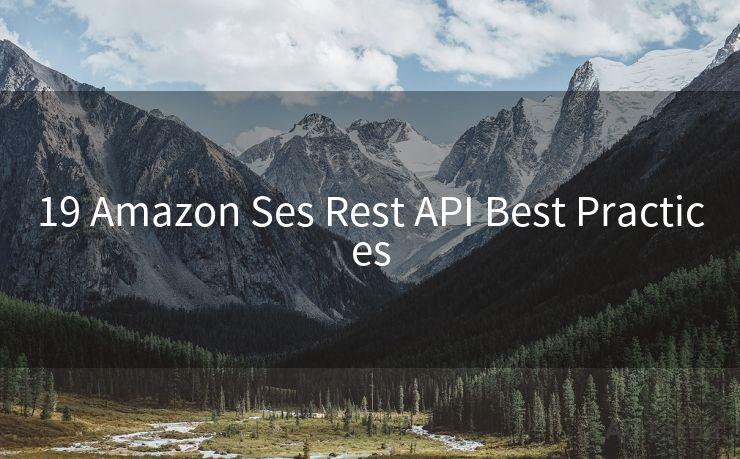19 Amazon Ses Rest API Best Practices




When integrating with Amazon Simple Email Service (SES) via its REST API, it's crucial to follow best practices to ensure efficient and secure communication. Here are 19 essential best practices to guide you in making the most of the Amazon SES REST API.
1. Understand the API Limits
Before diving into the API usage, familiarize yourself with the Amazon SES sending limits. These limits help prevent abuse and ensure optimal service for all users. Plan your email campaigns accordingly to avoid hitting these limits.
2. Set Up Proper Authentication
Always use AWS Identity and Access Management (IAM) to create and manage AWS users and groups with permissions to access Amazon SES. This ensures secure access to the API and prevents unauthorized use.
3. Use the Latest API Version
Stay up to date with the latest version of the Amazon SES API. Newer versions often include improvements, bug fixes, and additional features.
4. Handle API Responses Appropriately
When making API requests, always check the response codes and messages. This helps you identify and troubleshoot any issues that may arise during the communication process.
5. Implement Error Handling
Prepare your code to handle potential errors gracefully. Use try-catch blocks and appropriate error messages to manage exceptions and ensure your application's stability.
6. Optimize Your Email Content
Craft your emails with care. Use a clean, responsive design and ensure your content is engaging and relevant to your audience.
7. Utilize Templates for Repeatable Emails
For frequently sent emails, such as welcome messages or password resets, use Amazon SES templates. This simplifies the process and ensures consistency in your messaging.
8. Monitor Your Email Deliverability
Regularly check your email deliverability metrics, such as bounce and complaint rates. These insights help you fine-tune your email strategies and improve your sender reputation.
9. Comply with Email Best Practices
Follow email best practices, including providing an unsubscribe link, using a recognizable sender address, and avoiding spammy content.
10. Leverage Dedicated IP Addresses
Consider using dedicated IP addresses for your email sending. This can help improve your email deliverability and provide more control over your sending reputation.
11. Implement Throttling
To avoid overwhelming the Amazon SES service or your recipients' inboxes, implement throttling mechanisms in your application. This ensures a steady and manageable flow of emails.
12. Test in a Sandbox Environment
Before going live, test your email sending process in a sandbox environment. This allows you to identify and fix any potential issues without affecting your production workflow.
13. Use Verified Email Addresses
Only use verified email addresses as senders. This adds credibility to your emails and reduces the chances of them being marked as spam.
14. Track Your Email Metrics
Utilize Amazon SES's built-in tracking features, such as open and click tracking, to gather insights into your email campaigns' performance.
15. Handle Bounces and Complaints
Regularly monitor and handle bounces and complaints. Use these insights to refine your email list and improve your email content and sending practices.
16. Secure Your API Keys
Protect your AWS access keys and secret keys. Never hardcode them into your application or store them in insecure locations.
17. Use Encryption
Ensure that all sensitive data transmitted via the API is encrypted, either using SSL/TLS or other secure protocols.
18. Keep Up with AWS Updates
Stay informed about AWS updates and announcements. These can include new features, security updates, or changes to the service that may affect your API usage.
🔔🔔🔔
【AOTsend Email API】:AOTsend is a Managed Email Service for sending transactional emails. Support Email Types: reminders, authentication, confirmations, notifications, verification codes, invoices, password resets, account activations, billing statements, two-factor authentication (2FA), and one-time passwords (OTP) emails, etc. $0.28 per 1000 Emails. 99% Delivery, 98% Inbox Rate.
You might be interested in:
Why did we start the AOTsend project, Brand Story?
What is a Managed Email API, How it Works?
Best 25+ Email Marketing Platforms (Authority,Keywords&Traffic Comparison)
Best 24+ Email Marketing Service (Price, Pros&Cons Comparison)
Email APIs vs SMTP: How they Works, Any Difference?

19. Seek Expert Advice
If you're new to Amazon SES or encounter complex issues, don't hesitate to seek expert advice from the AWS community or professional consultants.
By following these 19 best practices, you can maximize the effectiveness and efficiency of your Amazon SES REST API usage, ensuring smooth and secure email communications for your business.




Scan the QR code to access on your mobile device.
Copyright notice: This article is published by AotSend. Reproduction requires attribution.
Article Link:https://www.mailwot.com/p2703.html



